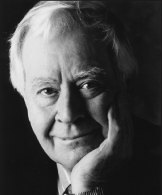By Jerry Tallmer
Some people get up in the morning and go to Wall Street. Or to their job in a department store. Or a supermarket. Or a newspaper office. Or to fly an airplane.
Horton Foote gets up in the morning and writes plays.
I wrote that 16 years ago as opener of an introduction to a Smith and Kraus collection of four (then) new plays by Horton Foote, but I don’t think Horton, the most generous of wordsmiths, will mind me here stealing from myself.
One of those new plays was the deep-digging “Dividing the Estate,” which finally reached and zinged New York only last year and is now in re-rehearsal with the same superb cast (spiked by Horton’s daughter, Hallie, as acerbic Mary Jo) and same fine director, Michael Wilson, for an April opening at the Hartford Stage Company.
Horton, I hate to have to say, or to think, won’t be getting up to write a play this morning or any other morning. (Gershwin is dead but I don’t have to believe it if I don’t want to, said John O’Hara when George Gershwin went.) We will have to make do with the huge rich heritage of ingrained-American theater Horton has bestowed upon us; his own undivided estate, from “Texas Town,” 1941, his first full-length gamble, to the very latest work-in-progress, 68 years later — about a tax assessor who feels sorry for the people he’s assessing — that will now never be finished.
This congenial, startlingly modest playwright — of dramas that beneath the surface were not at all congenial — left us, in his sleep, last Wednesday morning, March 4, 2009, at age 92, up there in Hartford, Connecticut, where he was at work (of course!) on transforming his nine-part “Orphan’s Home” cycle — about his father’s family during the World War I years — into a trilogy for presentation next fall at Hartford and here in New York at James Houghton’s Signature Theater.
It was the Signature that had brought Horton, a many years resident of Horatio Street, once again back into the limelight with an all-season 1994-’95 roster of plays by him. They were plays about people, sensate human beings, not stick figures, or caricatures, or robots, or dolls, or loonies, or beasts, but plain ordinary oft-troubled people …
Except, of course, for the small fact that — as Chekhov above all shows us, and showed Horton, who in turn explored this vein in his own voice (or melting pot of hundreds of voices) — there are no such things as ordinary people, and what a good playwright has to do is dig out the extraordinary that’s within the ordinary of each and every member of our peculiar species.
To Horton, there was only one universal experience. “The thing that is relevant for all time,” he told an interviewer, “is the subject of grief.”
Horton Foote, I went on to say in that introduction to the four plays, “writes the way people talk, or the way you think they talk, or the way you wish you thought they talk, or once did talk, in your mind’s eye (and ear). The way they talk in their [old-school] American of ‘Yes, Ma’am’ and ‘Yes, Sir’ which you may or may not have been born into since it probably predates your own birth, but in any event you long for with the sweet exciting ache of what I once termed nostalgia manqué, nostalgia for something before your time that you never knew, not directly … ”
The way they talk, or talked, and think, or thought, in and around the small, sleepy Texas town of Wharton, where Albert Horton Foote was born, March 14, 1916 — Wharton, protectively renamed Harrison in all the plays, some 55 miles from Houston, 90 miles from Galveston on the gulf. Oil country. Cotton and corn country. Once upon a time. Now (at the time of “Dividing the Estate”) given over to fruit stands, Whataburgers, McDonald’s, a plastics factory.And closed shops, stores gone, movie theater gone, restaurants gone, tumbleweed blowing down empty streets.
It was choreographer Agnes de Mille who long ago gave young, unsure Horton Foote the standard advice which is also the best advice anyone could give, or receive: “Write what you know.” Horton did just that for the next 70 years, drawing on what he knew from boyhood on: those voices, memories, stories, griefs, of fathers, mothers, sons and daughters, aunts, great aunts, great grandmothers, ancestors, townsfolk, strangers, everybody.
I’ve called it tough-truth drama — speak softly and wield a blistering bat.
It was Fred Coe of NBC and CBS who put Horton Foote to work during the Golden Age of television in the 1950s, catching even my tele-negative eye with meritorious dramas like “The Trip to Bountiful.” Whenever I liked something on TV, there was Horton’s name attached to it.
Of course he had been spoiled, because it was also the Golden Age of fabulous actresses, Lillian Gish, Kim Stanley, Geraldine Page, Eva Marie Saint, Lois Smith — women to whom he’d be in thrall for the rest of his days.
If Anton Chekhov is at one end of the Horton Foote rainbow, and Lillian (Tough-Truth) Hellman is at the other, who’s in the center, the main arc? Why Thornton Wilder, of course, because Grovers Corners, New Hampshire, and Harrison, Texas, have a lot in common. It’s called Humanity.
Saturday, another March 14, would have been Horton’s 93rd birthday. The funny thing is, it’s we who get the presents and Horton who has so bountifully given them to us.





































